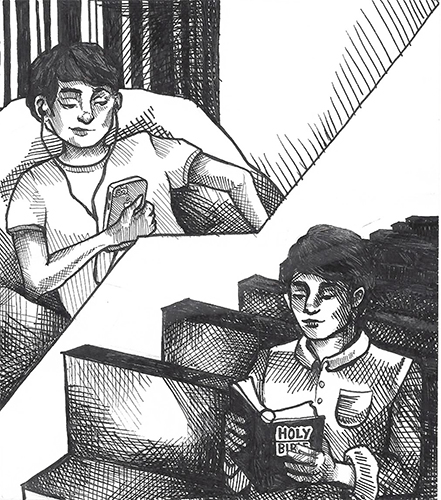Give religion your whole heart, take spiritual action
February 10, 2017
How religious do you consider yourself to be? Maybe you’ve been A1 since day one for a Catholic band, or you have your own playlist of Nasheeds. Maybe you lowkey go to youth group to scout dating prospects, or you’ve read the Torah so many times you can list the genealogy of Abraham.
Regardless, if we believe in a religion, what is keeping us from finding wholehearted conviction? As independent thinkers, if there is an objective truth underlying a religion with larger than life implications, why can’t we have an unyielding faith that permeates all areas of our lives?
In my opinion, one obvious reason is doubt. Doubts in the process of committing to a college can be magnified because it has an impact for four years of our lives, and beyond. What if I choose the wrong college?
Likewise, doubts are inherent in religious belief, because religion theoretically impacts our whole lives, in addition to what happens after we die. What if my religious beliefs aren’t grounded in truth?
I believe that it is important to try to answer this question. To do this, I challenged myself over the summer to venture into atheist territory and read chapters in The God Delusion by Richard Dawkins. I genuinely admired Dawkins’ logical reasoning and gained valuable insight into arguments against the existence of a deity.
On the other hand, we should consider exploring arguments for our beliefs. There are many highly acclaimed apologetic books for every religion. Famous debates by accomplished scholars published online are also means to confirm one’s beliefs, or one’s doubts.
However, in my opinion, we should not underestimate our own personal experiences. Logical, evidence-based reasoning is good too, but our own personal experiences can often give us the strongest convictions. Spend time reflecting on signs of affirmation of your religion in your life.
Overall, throughout our journey to find truth, we may find that our doubts turn out to be true, or we may find stronger conviction in our religion. Either way, we are left with a set of beliefs that we can defend more strongly and boldly than before, and I believe this should be our goal.
Another factor preventing us from strengthening our conviction that is possibly more influential than our doubts is our environment.
The phrase “separation of church and state” can apply to many of our lives in that it is almost impossible for a religious life and school life to coexist. I think the Bible says it is easier for a camel to go through the eye of a needle than for a high school student to enter the kingdom of God.
Not many people can understand how hard it is for students to be audacious in faith, especially if it is so much more rewarding to neglect religion. Yet I lose respect for people, although I am a culprit myself, who allow their convictions to waver for a temporal sense of acceptance.
With this in mind, it is nearly impossible to follow your religion more wholeheartedly if you are doing it alone. Our surroundings and who we spend time with influence us more than we can probably imagine.
I believe so much weight is taken off your shoulders if you look for like-minded believers around you. Sometimes you won’t even know if one of your friends is religious because conversations about religion are so taboo at school.
I feel that just a hint of vulnerability and a step of courage in front of peers can help strengthen your convictions and make it less tempting to be swept up by what everyone is doing. Efforts like a religious club and weekly school prayer meetings have helped me carve away the double image associated with religious and social life.
This column is not a “get thee to a nunnery” tirade or an attempt at proselytizing, but simply a note of encouragement with a few possibly helpful tips for struggling followers of a religion. If your religion determines your whole life and beyond, why not put your whole heart into it?



